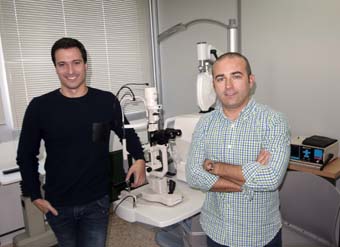
The Optometry Research Group (GIO) of the University of Valencia Faculty of Physics has been entrusted with the coordination of a four-year €2.5 million European project to improve the diagnosis and treatment of dry eyes. Lecturers in the UV Department of Optics will develop the European Dry Eye Network (EDEN) initiative, which involves four academic institutions —the University of Valencia, Aston University (United Kingdom), the Complutense University of Madrid and the Institute of Biomedical Engineering and Instrumentation of the Wroclaw University of Technology (Poland)— as well as the European hospital chain Optegra and several multinationals in the sector.
The principal investigator in EDEN, David Madrid, states that this project will have «an important effect on public health because dry eye has a multifactorial aetiology and, at present, there is not any effective tool to diagnose it, which often results in us not being able to prescribe treatments that are a hundred per cent effective». In fact, dry eyes are one of the most common reasons for ophthalmology consultation in developed countries. It is estimated that approximately 30 per cent of the patients who visit an ophthalmologist or an optometrist have symptoms compatible with dry eye.
Even though this pathology affects people of all ages and genders, its occurrence increases with age. In addition, «different studies have revealed that in view of the marked ageing of the population in developed countries, the number of people with dry eye will substantially increase over the next few years», says Madrid. In turn, other factors such as the use of computers, the use of contact lenses and refractive surgery (to treat myopia or a cataract) also have an influence on this condition. «Exposure to air conditioning, pollution or low-humidity environments –cars, planes, offices, shopping centres– increase the evaporation of tears and, as a result, the signs and symptoms of dry eye intensify», adds the researcher in the Department of Optics.
This European project follows different lines of research arranged into three workstreams. On the one hand, it seeks to create new systems that allow an objective and non-invasive diagnosis of the different aetiologies of dry eye. On the other hand, it analyses the effect of new treatments. And finally, it examines the risk factors that may contribute to the development of this pathology and increase its symptomatology.
NEW TECHNIQUES AND MEDICINES
In addition to coordinating the project, the University of Valencia will focus on analysing biomarkers in healthy patients’ tears in order to be able to make an early diagnosis of dry eye. It will also evaluate the changes in tears induced by contact lenses and by different eye surgeries.
Among the diverse actions of EDEN, it is worth mentioning the one led by Aston University, which will create a model of an artificial eye to test treatments and will carry out an epidemiological analysis of prevalence of the disease. At the Institute of Biomedical Engineering of Wroclaw University, in Poland, new techniques will be developed to analyse the tear film in an objective and non-invasive manner. And, for its part, the Complutense University of Madrid will proceed with the formulation of a new medicine.
The EDEN project comes under the Excellent Science pillar of the Horizon 2020 EU Programme and was selected under the Marie Sklodowska-Curie Innovative Training Networks (ITN) call for proposals. EDEN will recruit ten predoctoral scientists. Furthermore, a joint doctoral study programme will be created by the academic institutions involved in this network, so that the ten researchers recruited will obtain the doctoral degree by, at least, two European universities from different countries.
STRONG COMPETITIVENESS
The technical director of the University of Valencia European Research Projects Office (OPER), Àngels Sanchis, highlights the competitiveness of these European calls addressed to research networks, due to the large amount of funding that they involve. In fact, in the current ITN process just eight proposals have obtained funding and EDEN has been the second most valued, with 2.5 million euros.
This project by the Optometry Research Group, led by Professor David Madrid, «is the first one that the University of Valencia has obtained in this modality that entails delivering a joint doctoral study programme. With this, thanks to EDEN, we are pioneers in offering joint degrees awarded by a European network that, additionally, is coordinated by our university, without forgetting that we are already part of an ITN in the form of an industrial doctorate, run by chemical engineering professor Carmen Gabaldón». Sanchis highlights the importance of cooperating with the UV Postgraduate Service through European initiatives like this one, because «together with the necessity of promoting research, we must keep in mind that teaching is one of the university’s core missions».
EIGHT MILLIONS IN TWO YEARS
The Optometry Research Group of the UV Faculty of Physics has become one of the international research groups with the highest funding. In less than two years it has obtained over 8 million euros to develop its activity in the field of myopia, accommodation, presbyopia, cataract and dry eye. The director of the group, Robert Montés, points out that their current investigations are among the main lines of interest for the European Union, whose Horizon 2020 programme «promotes not only innovation, but also industrial participation, which is a fundamental characteristic in the applications of our group». And he concludes: «excellence in science funded by the European Research Council (ERC) or by Marie Curie actions is our working basis».
Further information:
Last update: 5 de december de 2014 08:09.
News release


















